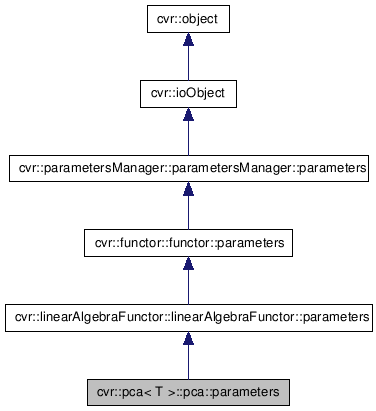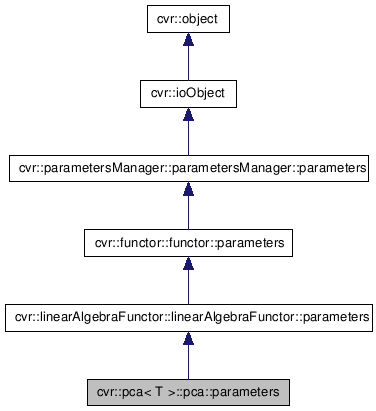

|
last update 20 Sep 2009 |
|
#include <cvrPCA.h>


Public Member Functions | |
| parameters () | |
| parameters (const parameters &other) | |
| ~parameters () | |
| const std::string & | name () const |
| parameters & | copy (const parameters &other) |
| parameters & | operator= (const parameters &other) |
| virtual parameters * | clone () const |
| virtual parameters * | newInstance () const |
| virtual bool | read (ioHandler &handler, const bool complete=true) |
| virtual bool | write (ioHandler &handler, const bool complete=true) const |
Public Attributes | |
| int | resultDimension |
| bool | autoDimension |
| bool | useCorrelation |
| bool | whitening |
| T | relevance |
| bool | centerData |
| bool | useSVD |
| cvr::pca< T >::pca::parameters::parameters | ( | ) |
Default constructor.
Reimplemented from cvr::linearAlgebraFunctor::linearAlgebraFunctor::parameters.
| cvr::pca< T >::pca::parameters::parameters | ( | const parameters & | other | ) |
Copy constructor.
| other | the parameters object to be copied |
Reimplemented from cvr::linearAlgebraFunctor::linearAlgebraFunctor::parameters.
| cvr::pca< T >::pca::parameters::~parameters | ( | ) | [virtual] |
| virtual parameters* cvr::pca< T >::pca::parameters::clone | ( | ) | const [virtual] |
Return a pointer to a clone of the parameters.
Reimplemented from cvr::linearAlgebraFunctor::linearAlgebraFunctor::parameters.
| parameters& cvr::pca< T >::pca::parameters::copy | ( | const parameters & | other | ) |
Copy the contents of a parameters object.
| other | the parameters object to be copied |
Reimplemented from cvr::linearAlgebraFunctor::linearAlgebraFunctor::parameters.
| const std::string& cvr::pca< T >::pca::parameters::name | ( | ) | const [virtual] |
Return name of this class.
Reimplemented from cvr::linearAlgebraFunctor::linearAlgebraFunctor::parameters.
| virtual parameters* cvr::pca< T >::pca::parameters::newInstance | ( | ) | const [virtual] |
Return a pointer to a new instance of the parameters.
Reimplemented from cvr::linearAlgebraFunctor::linearAlgebraFunctor::parameters.
| parameters& cvr::pca< T >::pca::parameters::operator= | ( | const parameters & | other | ) |
Assigns the contents of the other object to this object.
Reimplemented from cvr::linearAlgebraFunctor::linearAlgebraFunctor::parameters.
| virtual bool cvr::pca< T >::pca::parameters::read | ( | ioHandler & | handler, | |
| const bool | complete = true | |||
| ) | [virtual] |
Read the parameters from the given ioHandler.
| handler | the ioHandler to be used | |
| complete | if true (the default) the enclosing begin/end will be also read, otherwise only the data block will be read. |
Reimplemented from cvr::linearAlgebraFunctor::linearAlgebraFunctor::parameters.
| virtual bool cvr::pca< T >::pca::parameters::write | ( | ioHandler & | handler, | |
| const bool | complete = true | |||
| ) | const [virtual] |
Write the parameters in the given ioHandler.
| handler | the ioHandler to be used | |
| complete | if true (the default) the enclosing begin/end will be also written, otherwise only the data block will be written. |
Reimplemented from cvr::linearAlgebraFunctor::linearAlgebraFunctor::parameters.
| bool cvr::pca< T >::pca::parameters::autoDimension |
| bool cvr::pca< T >::pca::parameters::centerData |
This flag denotes if the transformed data should be centered around zero.
This is the usual behaviour of the PCA, but for some special operations it may be necessary to disable this. If the flag is false, the mean of the transformed data is moved to the transformed mean of the source data.
Default value: true
| T cvr::pca< T >::pca::parameters::relevance |
The factor which determines relevant eigenvectors.
An eigenvector is considered relevant if its eigenvalue is at least as large as the largest eigenvalue divided by this number. Usually, it takes values between 1e4 and 1e6.
Default value: T(100000)
| int cvr::pca< T >::pca::parameters::resultDimension |
Final dimension of the reduced vectors.
Default value: 3
| bool cvr::pca< T >::pca::parameters::useCorrelation |
| bool cvr::pca< T >::pca::parameters::useSVD |
When true, singular value decomposition instead of eigensystem solution is used to calculate the eigenvectors and eigenvalues.
This can be much faster and less memory consuming.
Default value: false.
| bool cvr::pca< T >::pca::parameters::whitening |
This flag determines if the functor should perform a whitening transform of the data.
Whitening means that 1. A PCA is performed, using the covariance matrix for eigenvector computation 2. A scaling of the transformed data by the inverse of the square root of the eigenvalues.
You have to set useCorrelation to false if you use whitening.
Default value: false.